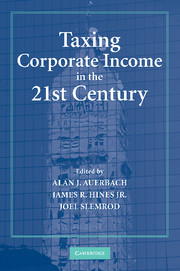Book contents
- Frontmatter
- Contents
- Contributors
- Preface
- 1 The Effects of Taxes on Market Responses to Dividend Announcements and Payments: What Can We Learn from the 2003 Dividend Tax Cut?
- Comments
- Comments
- 2 Dissecting Dividend Decisions: Some Clues about the Effects of Dividend Taxation from Recent UK Reforms
- Comments
- Comments
- 3 The 2003 Dividend Tax Cuts and the Value of the Firm: An Event Study
- Comments
- Comments
- 4 How Elastic Is the Corporate Income Tax Base?
- Comments
- Comments
- 5 An Empirical Examination of Corporate Tax Noncompliance
- Comments
- Comments
- 6 On the Extent, Growth, and Efficiency Consequences of State Business Tax Planning
- Comments
- Comments
- 7 Corporate Taxation and International Competition
- Comments
- Comments
- 8 The Changing Role of Auditors in Corporate Tax Planning
- Comments
- Comments
- 9 Taxation and the Evolution of Aggregate Corporate Ownership Concentration
- Comments
- Comments
- Index
- References
1 - The Effects of Taxes on Market Responses to Dividend Announcements and Payments: What Can We Learn from the 2003 Dividend Tax Cut?
Published online by Cambridge University Press: 30 July 2009
- Frontmatter
- Contents
- Contributors
- Preface
- 1 The Effects of Taxes on Market Responses to Dividend Announcements and Payments: What Can We Learn from the 2003 Dividend Tax Cut?
- Comments
- Comments
- 2 Dissecting Dividend Decisions: Some Clues about the Effects of Dividend Taxation from Recent UK Reforms
- Comments
- Comments
- 3 The 2003 Dividend Tax Cuts and the Value of the Firm: An Event Study
- Comments
- Comments
- 4 How Elastic Is the Corporate Income Tax Base?
- Comments
- Comments
- 5 An Empirical Examination of Corporate Tax Noncompliance
- Comments
- Comments
- 6 On the Extent, Growth, and Efficiency Consequences of State Business Tax Planning
- Comments
- Comments
- 7 Corporate Taxation and International Competition
- Comments
- Comments
- 8 The Changing Role of Auditors in Corporate Tax Planning
- Comments
- Comments
- 9 Taxation and the Evolution of Aggregate Corporate Ownership Concentration
- Comments
- Comments
- Index
- References
Summary
Introduction
There is a long-standing debate in the finance and public economics literatures about the role of taxation in corporate dividend payout policies. Starting with Elton and Gruber (1970), researchers have investigated whether the tax-favored treatment of capital gains relative to dividends affects excess returns on ex-dividend and announcement dates. The answers to these questions can potentially shed light on the efficiency consequences of dividend taxation as well as the reasons why corporations pay dividends despite their tax disadvantage, as explained in greater detail below. Despite substantial research, the empirical literature on this topic remains controversial (see Allen and Michaely, 2003 for a recent survey).
This paper proposes to use the 2003 dividend tax cut in the United States to cast light on these issues. The 2003 tax cut, part of the Jobs and Growth Tax Relief Reconciliation Act of 2003, eliminated most of the tax disadvantage of dividends relative to capital gains. Blouin et al. (2004) and Chetty and Saez (2005) have shown that the reform indeed raised dividend payments significantly and in particular induced many firms to initiate dividend payments. Here, we aim to investigate whether this reform had a significant effect on the ex-day and announcement-day price behavior as well. Consistent with the no-arbitrage conditions in standard models, we find that the ex-dividend day premium increased from 2002 to 2004, when the dividend tax rate was cut.
- Type
- Chapter
- Information
- Taxing Corporate Income in the 21st Century , pp. 1 - 32Publisher: Cambridge University PressPrint publication year: 2007
References
- 10
- Cited by



